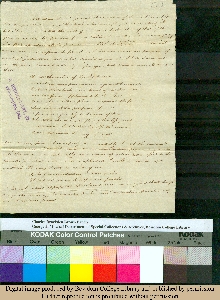 ― [page break] ― ― [page break] ―
It is certain that in general the excellence of the workmanship
depends upon the nature of the tools, which are employed in executing it
but I know not whether the quill of a crow is better than of that of the
goose, or whether it is plucked from a Nobler Animal. I once was guilty
of a Peter-pindarical performance in which those ‸creatures were converted into
orators and were suffered to plead, each his own cause, in presence of
a critical judicature. And what decision do you think? As I have not
now the piece, I cannot certainly inform you, but there is reason to Imagine
that
| | By all the rules of Equity below |
| | A Sentence was pronounced against the crow. |
| | That all the shouts were heard of all the wise |
| | And Mr. Goose applauded to the Skies. |
| | As one whose silken plumes supplied the pen |
| | Best suited to the purposes of men. |
| | A pen most friendly to the ease of those |
| | Who teach the streem to flow of lawless prose |
| | And those who blasted by Apollo’s curse |
| | Adore the mad divinity of verse. |
You see, my friend, how rapidly and inevitably I catch the poetical
contageon, and slide into verse as an overloaded promontory sinks
into the ocean: as naturally as a storm-uprooted cedar falls to the
ground. You shall not want a splendid Simile—nor an apt
quotation: For may it not be said of us
| | Ambo florentes aetatibus. Arcades Ambo |
| | Et Cantare pares, et respondere parati |
I will not indeed appropriate the Second line, nor imagine that though
though the we may be "Arcades Ambo" and "respondere parati," we
are "Cantare pares"
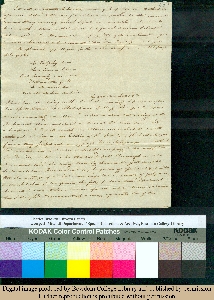 ― [page break] ― ― [page break] ―
Is it not preposterous to be very axious of propriety and Method in
a familiar letter? A Stanza of a celebrated composition has this moment
occurred to my memory, which I find an irresistable inclination to
honour with a place in this epistle, but for what reason I should
introduce it, or how to excuse the impropriety of its insertion! —Were you
ever in so whimsical a predicament? This it is. I will give it to you
and will afterwards appollogize for the awkwardness and worthlessness
of the gift.
| | In 'Delphy town |
| | There lives a Clown |
| | That formerly was wise |
| | But now the fool |
| | Is all mens tool |
| | And all do him despise |
I have been sauntering in the park this morning. I purpose after
Breakfast to visit the Shakesperian Gallery. Strangers I suppose
are indiscriminately admitted. I was put on shore last evening at the
Parliament Stairs, and spent an hour at the "Queens Arms" with
a Templar. A Stupid Wretch. An Enthusiast in Law. He soars to
nothing lower than a new Edition of the Statutes, with half a league
of commentary foisted into every page. The English lawyers seem to think
that some laborious compilation is absolutely necessary to the completion,
of a Barrister. He told me he intended to pull Bearcroft or (. as he
denominated him,) the crafty bear, by the nose the first time he
should meet him. "Because (said he) "he yesterday asserted at Westminster
that the writings of Ld. Coke were singular compounds of folly, and
wisdom, but that in his opinion, the folly predominated." I pretended
to be scared to death at this audacious assertion, and told my companion
that I thought it incumbent upon every legitimate Son of the
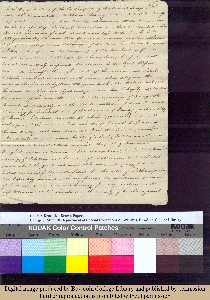 ― [page break] ― ― [page break] ―
british Themis to stand forth the champion of the learned Judge and
venerable Commentator. He told me that my Sentiments had his hearty
approbation, and insinuated that his appearance at the bar would
be the Era of a Legi Juridical Revolution, and that he intended when
the natural course of events should raise him to the bench, to be
distinguished by his veneration for ancient maxims, and his adherence
to the pure and genuine language of the law. I ventured to enquire
whether, in his opinion, the language of the law had suffered
corruption in those latter ages. Yes, (he replied) he, for his part,
had almost intirely confined his studies to the legal Classics;
had made himself a thorough master of the norman and Latin
diallects, and had studied, with unexampled diligence, the
writers on the feudal System, the year-books, the Statuti-Antiqui
the Saxon Annalists and Legal Antiquarians. He I highly applauded
the wisdom of his conduct, lamented the degeneracy of the age, the
fascinations of Novilty, and the fatal substitution of Sence for sound,
of reasoning for precedent; and of the eloquence of Murray for the subtlety
of Plowden. I deplored the contempt which began visibly to prevail
with regard to the common Law, and the fashionable preferance of
Roman Oratory and Jurisprudence. I solicited him to propose ‸ me as
a Candidate to a numenous Society, of which (he told me) he was
a member, and, at that time, occupied the post of president
Though I was born in America, I had always been (I said) a determined
adversary of Rebellion and had done essential services to the British
government, to the great and irreparable detriment of my fortune.
In short I so successfully counterfeited the Character of Littleton junior
that I speedily procured, with my friend, the reputation of a Man
of Sence and penetration, and he very formally invited me to
sup to Morrow at his chambers, with a party of his chosen friends
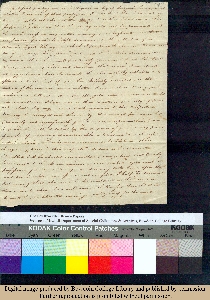 ― [page break] ― ― [page break] ―
But first finding me so intelligent on legal Subjects, he enquired
whether I was one of that profession. I told him that I had always
been invincibly attached to the Study, but that I had no motive
for practicing the law. That this study could not be prosecuted with
the same success in my native country as in England, and that
one purpose for which I left America, was the collection of an
extensive legal library: in which I purposed to consume the remain=
=der of my days. "Every Man" (continued I.) "will be distinguished
by some or other whimsical peculiarity. You must know Sir that
I have made my will, and directed that as soon ‸ as I am dead
all my volumes shall be burnt, the ashes carefully collected, and,
after some Anatomical operator has skillfully extracted all the
contents of the cranium, under whatever denomination it may pass
cerebrum, cerebellum or Medulla oblongata, outer and inner, corticalis
and Medullaris. I have ordered that a certain quantity of those
ashes shall, by any means least injurious to the Occiputal
Œconomy, be conveyed into the cavity. This strange procedure, Sir
(earnestly and significantly fixing my eyes upon me him.) was,
to speak the truth, dictated by the dispair of finding any person
of worthy of inheriting so inestimable a treasure. "And, therefore,
as this despair would be now unreasonable, I believe I shall
change my Will in this respect." As soon as I uttered this,
I trembled lest he should discover that I was jesting, but luckily
he continued to think me serious; and we parted, after mutual
professions of esteem and regard, at a very late hour. After the
invitation to supper was offered and accepted, I happily discovered
that among those who are to be his visitants on that occasion
there is one to whom I am well known. I therefore thought it best
to write him a letter this morning, apollogizing for the accident
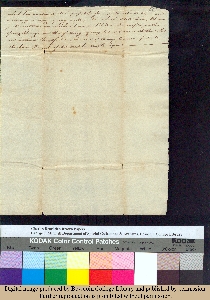 ― [page break] ― ― [page break] ―
which has rendered it impossible for me to attend him, and
enclosing a copy of my will, with which, I tell him, I have
just executed, in which I have prohibited the conflagration
of my library, and the filling of my brain-pan with the ashes
and, instead thereof, have devised it to my learned friend,
Abraham Bennet of the Middle temple Esquire ———
|